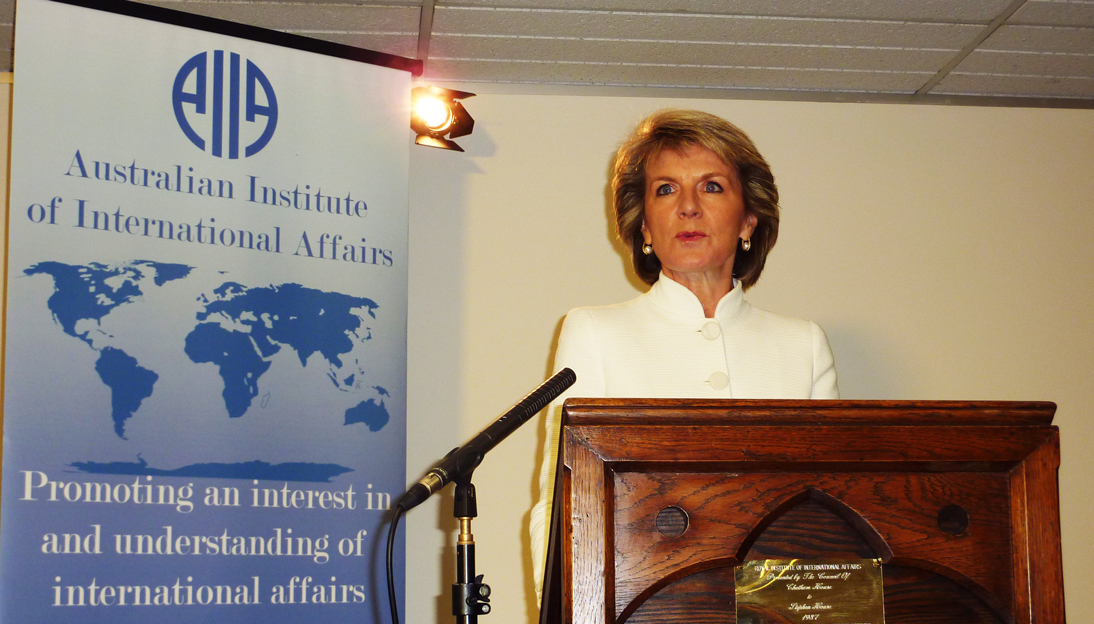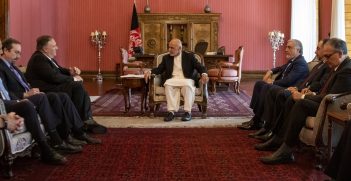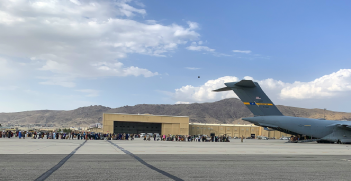Australian Foreign Policy: Regional or Global?

The Australian Institute of International Affairs is one of our nation’s premier think tanks and contributes a great deal to the development and dissemination of ideas and debates on foreign policy and I’m sure this year’s National Conference will take its reputation to even greater heights.
The theme today is a deliberate challenge to a room full of strongly held opinions: “Australian Foreign Policy – Regional or Global?” The simple answer, of course, is that we do not have the luxury of choice – nor should we choose. We must actively pursue an approach that advances and deepens our interests in all spheres. The relative focus given to regional or global issues, which are overlapping, is driven by our ability to either shape events or respond to events beyond our control.
Australia is more than a middle power. Ours is a significant voice in international affairs. We are a top 20 nation in virtually all social and economic indicators that reflect the status and values of nations. As the 12th largest economy in the world, our GDP is ahead of Russia, Spain, Mexico, Indonesia, the Netherlands and Turkey. On a per capita basis we are the fifth largest.
We are one of the most prosperous, safe, open, free and democratic countries in the world. Australia has an overwhelming interest in contributing to a global order that is peaceful and stable: a consistent, rules-based world order that operates in a way that allows us to support our values, our interests. We tend to be internationalist in pursuit of our values, regionalist in terms of our interests, bilateralists as a priority and the focus we give to each is shaped and nuanced by the challenges, opportunities and circumstances we face.
I have been using the term Indo-Pacific to describe our region for we are a continent straddled by two of the world’s great oceans – the Indian and the Pacific – a description which encompasses the countries of Asia. The transformation of the Indo-Pacific in recent decades has been nothing short of remarkable. It has also been fundamental to the development of our national economy.
Japan emerged as an economic powerhouse in the second half of the twentieth century and the Japan-Australia relationship became our most comprehensive in the region. For many decades Japanese investment has been and continues to be particularly crucial to the development of Australia’s resource sector. The subsequent rapid growth of the South Korean economy was also significant – it is now our fourth largest trading partner.
China’s industrialisation – on a scale and at a pace never seen before in human history – has not only lifted hundreds of millions of people out of poverty, it has had significant flow-on effects for the region and the world. Today, China is the world’s second largest economy and our largest two way trading partner. Indeed, China is oft cited as the largest merchandise trading partner of at least 100 countries or even 120 countries around the globe.
Within the next two decades, India’s economy is expected to surpass Japan’s to become the world’s third largest from 9th largest today. Southeast Asia’s “tiger” economies – particularly Indonesia, Vietnam and Malaysia – are growing almost as quickly.
Already a vibrant democracy, Indonesia is tipped to have the fourth largest economy by mid-century. With its increasing economic heft, Indonesia will inevitably play a greater leadership role in the region in the future and with even closer cooperation between our two neighbouring countries, together we can help build greater regional prosperity and security.
Economic and social development has never been a linear process and there will be set-backs along the way, particularly as nations strive to avoid the so-called middle income trap. The regional economy is at a critical juncture in 2015.
China’s economy is transitioning from an export-led model to one increasingly being driven by domestic consumption and services – this is likely to be a challenging and potentially painful process.
Japan is undertaking major economic reforms to escape 25 years of sluggish domestic economic growth, while South Korea is facing some economic headwinds. The boom years are easing and a number of major Asian economies face deep structural reform challenges that will test the skill and the courage of their policy makers. Slowing growth has implications for Australia, economically and strategically.
In response to these challenges, and in addition to the reforms and responses in our domestic agenda, I have overhauled Australia’s diplomatic agenda to focus on what I call “economic diplomacy”. Just as traditional diplomacy promotes peace, economic diplomacy promotes prosperity. This is using our diplomatic resources, networks and connections to promote trade and investment with an unprecedented focus. Indeed, our Heads of Mission have a KPI based on increased economic activity that they are able to generate with the host country.
Sustaining our prosperity into the future will require a determined focus on our global economic interests. We are an open export oriented market economy. Our standard of living depends upon the ability and capacity of our exporters, producers, manufacturers and service providers to find new markets or enhance existing markets for our goods and services with greater access to foreign capital.
In addition to the recent successful conclusion of the Trans-Pacific Partnership Agreement – the biggest trade agreement the world has seen in more than 20 years – the Australian Government has also secured Free Trade Agreements with Korea, Japan and China. These are game changers for the Australian economy: break-through agreements that will spur growth and give Australian exporters, large and small, the opportunity to further diversify and expand into the region. Growth is unlikely to reach the stellar heights of the recent past. However, even if growth does rebound, it is not guaranteed to lead to a more stable region.
The shifting power balances in the Indo-Pacific is well underway. Increasingly, China and India’s economic growth is underwriting the modernisation and growth of their militaries. Japan is taking steps to be a more “normal” security actor and the US continues to maintain a significant advantage in its strategic and defence capabilities.
Weapons acquisition in Asia has seen a sustained build-up with naval weapons being the primary focus of both purchases and intentions to acquire. China’s strengthened naval capability is apparent to all, and countries in our region are also embarking – on a more limited scale – on programs to upgrade, enlarge and enhance the capability of their submarine fleets, while others have begun to acquire their first submarine capability.
About two-thirds of Australia’s trade passes through the disputed maritime zone of the South China Sea. Clearly, rising tensions between rival claimants in the South or indeed the East China Seas could have major implications for the region and for Australia.
While we do not take sides on the competing claims, we have consistently urged restraint and peaceful negotiations as a means to resolve these claims and disputes. This has been the subject of considerable discussion at regional forums in recent months including the ASEAN regional forum and East Asian Summit Foreign Ministers’ meetings.
It was also an important topic of conversation during the talks Defence Minister Marise Payne and I held with US Secretary of State John Kerry and US Secretary of Defence Ash Carter during the annual Australia-US Ministerial Consultations or AUSMIN in Boston last week.
It is crucial that we consistently articulate our interests in the maintenance of peace and security in the region.
Strategically, Australia is also committed to greater engagement with the region’s institutions as a way to manage the fundamental shifts in power taking place in the Indo-Pacific. We are working with partners to particularly strengthen the East Asia Summit, to entrench consultation and better equip the region to address its strategic challenges. This is the premier forum with the relevant mandate to find common ground on regional issues of concern.
The important changes taking place in our region are part of a broader picture with global implications.
Since Australia’s earliest days, we have been the beneficiaries of alliances and relationships which have aligned with our commitment to liberal-democratic rule and the values with which Australia readily identifies.
The establishment of the United Nations in the aftermath of World War II has underpinned a rules-based global order. For example under UN auspices, the Nuclear Non-Proliferation Treaty – arguably, the world’s most important security instrument – was concluded at the height of the Cold War.
The Bretton Woods Conference established a set of global institutions to better manage global financial and economic challenges. The International Monetary Fund and the International Bank for Reconstruction and Development – later the World Bank – have been instrumental in the development of the global economy.
Today, however, circumstances have changed and a greater number of states and other actors are competing for relative power. These changes are putting the multilateral system that has served us, not perfectly, but well, under significant pressure.
For example, Russia’s behaviour in Ukraine, its annexation of territory, military incursions and overt support for separatists reveal a contempt for the principle of state sovereignty, one of the pillars of the world order.
The rise of the violent terrorist organisation Da’esh is a direct challenge to the nation-state – the central unit of our international order – with its claims of a caliphate over parts of the sovereign states of Syria and Iraq. Australia is one of the largest contributors to the effort to defeat Da’esh in Iraq and in Syria. Not only do we foresee the disastrous consequences of a terrorist caliphate for the Middle East, we have our own security interest to protect with a disproportionate number of Australian citizens as foreign terrorist fighters in Syria and Iraq. Empowered by the use of modern technologies and social media, Da’esh is reaching out from its geographical base to encourage its supporters worldwide to undermine the institutions of the State.
Power and influence is diffusing to non-state actors in many parts of the world and not only to malevolent violent extremists who have no regard for sovereignty, borders or fundamental human decency.
In a vastly different context, wealthy individuals, NGOs and multinational corporations can now influence the world in ways that used to be confined to those who held the reins of national governments. Many command financial resources on a scale that surpasses a number of nations. In Australia there are unions and corporations running overt political campaigns with budgets larger than any political party. This is replicated across the world in many ways.
The individual attachment to the state is eroding. In future, events overseas will increasingly influence events at home and in many ways national borders will no longer be physical. Nation states will have less capacity to advance their national interests and a larger share of the transmission of ideas, trade and financial flows will take place outside state control. I do believe the national state will endure but the current global order will change, potentially quite radically.
While welcoming the emergence, or indeed re-emergence, of countries like China, India, Indonesia and others, it would be a mistake to overlook or underestimate the ongoing value and influence of those who have underpinned stability and prosperity in our region since the end of the Second World War. It would also be a folly to underestimate the ability of the US – the world’s only super power – to continue to adapt and transform in the years ahead to maintain its status and influence.
During my most recent visit to the US, I met with executives from the tech giants Google, Twitter, HP and Microsoft, and I discussed global affairs with a range of international relations experts, including the Rand Corporation, The Asia Foundation and Stanford and Harvard Universities as well as within the US Government. It is blindingly apparent that we are already seeing the beginning of a new wave of innovation in the US – perhaps greater in scope and impact than previously.
Revolutions in energy such as shale oil and technology including 3D printing and other disruptive forms are changing the way we live and work. The capacity of big data is helping us tackle security and economic challenges in unprecedented ways.
I visited one firm that is building tiny low-cost satellites the size of a shoebox with high definition lenses and launching them now from the International Space Station. About 50 are currently operating and when the number of satellites reaches 120 or beyond, they will fully photograph the earth every 24 hours – imagine how this can be used in mapping agriculture, water, drought and environmental trends. Once heat and an increasing array of sensors are embedded in these nano satellites, the information gathered will increase exponentially in value and utility.
The impact of these innovations and developments will likely safeguard America’s pre-eminent place in the world for decades to come. Nevertheless, we must be open to ongoing reform of global institutions and accept that new powers will look for alternative forums to accommodate their interests. We must engage and strengthen the forums that accommodate emerging powers and advance our interests: the G20, APEC and the East Asia Summit.
Australia has an overwhelming interest in ensuring that China’s presence on the global stage is accommodated in a way that contributes to its own, as well as regional and global stability. That’s why we are keen to partner with China in areas of convergence, such as addressing the infrastructure challenge in our region.
It is early days, however the Asian Infrastructure Investment Bank can potentially make a valuable contribution to global prosperity. Already China has embraced a number of principles that reflect the rules and standards developed by trial and error in the existing global financial institutions.
However we need to clearly understand that China – and a number of other emerging powers – will not be powers in our own image. This does not mean we should abandon the system that has served us so well in the past, or compromise our values and our principles. We must stand firm and uphold what we know is right. When international law is violated we must speak up and take appropriate action and we make our own judgements on what is in our own national interest.
While the P5+1 have negotiated with Iran regarding its nuclear program – with implementation subject to verification – Australia will not lift our sanctions regime until we are satisfied that Iran has met all its obligations.
At 70 years of age, the United Nations is imperfect – but it remains the most effective tool we have to address global security challenges. In fact, the UN Security Council, while long overdue for reform to reflect new global realities, is more essential than ever. Australia has a fundamental interest in the UN Security Council working to its full potential and adapting as necessary to maintain international peace and security in the face of contemporary threats – threats that could not have been conceivable at its inception.
For example, Australia was able to galvanise international support and a unanimous Security Council resolution over the Malaysian Airlines flight MH17 tragedy. We remain committed to hold those responsible for the downing of MH17 and, through our efforts to build and maintain international support and cooperation, we will continue to seek justice for the 38 Australians and others killed on that flight.
We are proud of our distinguished record on the 2013-2014 UN Security Council. Last month at the UN General Assembly Leaders’ Week in New York, I announced that Australia would nominate to serve again on the Council for the 2029-30 term. I estimate that a G20 country like Australia should aim to serve around every 15 years and this timeframe is manageable in terms of resources and priorities.
We make a significant contribution to global emergencies and the resolution of conflicts. Recently I announced an increase in our peace-keeping commitment to the United Nations. We stand up for our values and freedoms, rule of law, democracy and human rights. We’re prepared to defend them and to fight for them.
I also announced at the recent UN General Assembly Leaders’ Week that Australia will, for the first time, seek a place on the Human Rights Council in 2018-20. We are prepared to do our part to make the world a better place. Australia must play an active role and contribute to efforts to strengthen global security and peacekeeping. We cannot afford to sit on the sidelines at a time of fundamental change.
Ladies and gentlemen, Australia’s foreign policy should be pragmatic. It is not a choice between pursuing either bilateral, or regional or global interests. It is not a zero sum game. In today’s increasingly complex world, Australia must balance our interests across a diverse foreign policy agenda. Our immediate focus is of course on the Indo-Pacific: this is our neighbourhood and it will remain our primary area of interest. The Pacific is where we can do the most good and must be a focus of our efforts in terms of development.
We are embracing innovation at the heart of our aid and development agenda – finding new ways to solve intractable issues – using technology, leveraging the private sector and encouraging the economic empowerment of women.
However, as a Top 20 country with global interests, we must engage on global issues. We have legitimate interests to advance and protect. Our success in representing Australian interests and values overseas depends on our ability to adapt to new realities nimbly, accommodate emerging powers, shape the international system and embrace new thinking.
For example, I have established within the Department of Foreign Affairs and Trade an innovation hub called the innovationXchange to revolutionise the way we manage our aid budget and solve the more difficult and enduring aid and development challenges in our region. This is bringing together the brightest and most creative minds we can gather from the public sector, the private sector and with secondments from the World Bank and US Aid.
Through the innovationXchange we are transforming the way we meet these challenges. Already we have gained significant private sector support – including $80 million donation from Michael Bloomberg’s philanthropic fund to enable us to use the latest technologies to track previously unavailable health data so countries can target health funding and policies in ways never before possible. We cannot afford not to embrace innovation in our foreign policy.
The challenge for Australia’s foreign policy makers in the 21st century is to be creative and adaptive, to think laterally and embrace the future without forgetting the lessons of the past. We stand firm with our friends and allies, we are a trusted and reliable trading partner and we can be counted on to do our fair share on the global stage for our common good.
The Hon Julie Bishop MP is the Minister for Foreign Affairs. This article was adapted from an address to the Australian Institute of International Affairs’ National Conference at Hotel Realm, Canberra on Monday 19 October 2015. This article can be republished with attribution under a Creative Commons Licence.





